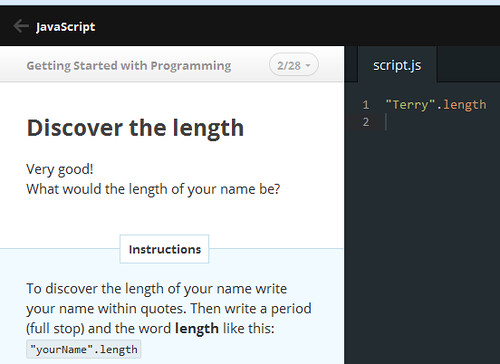Code Academy is an online tutorial-based website for teaching yourself how to code. You can select which programming language you wish to learn, from the following list:
- HTML and CSS
- JavaScript
- JQuery
- Ruby
- Python
- PHP
You can also practice building web applications using what you’ve learnt in HTML, CSS and JavaScript. If it’s apps that you’re interested in, you can make them more useful – and interesting – by connecting them to other services via APIs – Application Programming Interfaces.
 A screenshot from the JS tutorial. Note the counter telling you how many lessons you've cmpleted, and how many there in total
A screenshot from the JS tutorial. Note the counter telling you how many lessons you've cmpleted, and how many there in total
I thought I’d try learning Python. A few things impressed me:
First, you start coding right away by printing a greeting to the screen. This is good practice. It’s the equivalent of getting the computer program to print “Hello World”. It’s not going to have Zuckerberg quaking in his boots about a potential rival, but it’s a quick win that lets you see the results of your actions straight away.
Moreover, because it’s such a simple line of code, you can see immediately how it works.
Also, each lesson is very short. You just follow a few instructions and then see the results on the screen. If you do go wrong, it won’t take you long to spot where you made the error.
Each lesson also explains the theory behind what you’re doing, such as what a variable is.
If you feel so inclined, you can share your achievements with others thought he built-in badges provided.
I was impressed, too, by the fact that the application remembers the point you reached when you were last logged in.
Finally, it’s free.
I do have two criticisms.
First, when I deliberately entered an incorrect line of code, the application gave no feedback apart from ceasing to display the instruction “Save and submit”. Instead, it seemed to fold its arms and go into a sulk. I had to refresh my browser in order to get it to respond to me again.
Perhaps this was a temporary glitch, or confined to the Python module, because when I made a deliberate error a subsequent time, in the JavaScript tutorial, it did give me proper feedback in the form of telling me what I should do.
Second, the exercises were short and sweet, but seemed to be pointless. Perhaps I didn’t progress far enough, so I may be doing it a disservice, but I’m the sort of person who likes to have a definite project in mind.
Still, who’s complaining? Within about five minutes I discovered that Python is not as scary as I’d imagined it would be, and that in itself has encouraged me to go further. That confidence boost is exactly what a lot of classroom teachers will be needing over the next few months.
Link: Codecademycodecademy.com
This is a slightly modified version of an article that first appeared in Digital Education, the free newsletter for those with a professional interest in educational ICT and Computing. One of the benefits of subscribing – apart from access to unique content – is articles in a timely manner. For example, this article was published in the Early July 2014 edition.To sign up, please complete the short form on our newsletter page. We use a double opt-in system, and you won’t get spammed.
